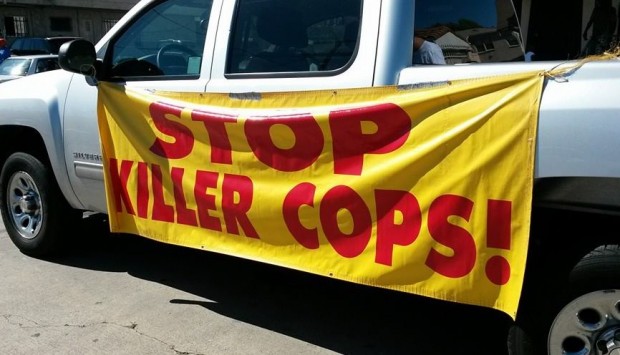 So…let’s see how many similarities Nationalist Movement Dick Barrett had with Eugene Terre’Blanche in South Africa. Both were white supremacists. Both had been in the white activist scene for decades. Both were in their sixties when they died. Both of them were at home when they were murdered. And now it seems, both cases resulted in the arrests of black men who did work for them at their homes. In Barrett’s case that would be 22-year-old Vincent McGee, who was a neighbor and did yard work for Barrett from time to time. And therein lies the rub. Just a few weeks ago Barrett, writing about Terre”Blache’s fate, wrote this on his website in its online newsletter section: “Mississippi confronts the same peril in reliance upon the labor of the descendants of African slaves, prompting an appeal to beef up security at Nationalist Headquarters. The passing of longtime staffer Paul Haecker and retirement of Scott Weaver had seriously reduced ranks. Nationalists were urged to provide funds and personnel to help upgrade security and equipment and prevent a Terre-Blanche-type tragedy.” He then runs down a list of people who he apparently worked with that couldn’t commit to a security detail in rural Mississippi. It similarities in the deaths of Terre’Blanche and Barrett were curious enough. Barrett also warning about the possibility of this fate coming his way – when he was never that important in the first place – is enough to say we need to see what is uncovered about this case before we start accepting Mr. McGee as the killer. Just bing a little cautious, that’s all. Doesn’t mean we aren’t in a state of Barrett bye-bye euphoria though. No, that’s going to be with us for a while!
So…let’s see how many similarities Nationalist Movement Dick Barrett had with Eugene Terre’Blanche in South Africa. Both were white supremacists. Both had been in the white activist scene for decades. Both were in their sixties when they died. Both of them were at home when they were murdered. And now it seems, both cases resulted in the arrests of black men who did work for them at their homes. In Barrett’s case that would be 22-year-old Vincent McGee, who was a neighbor and did yard work for Barrett from time to time. And therein lies the rub. Just a few weeks ago Barrett, writing about Terre”Blache’s fate, wrote this on his website in its online newsletter section: “Mississippi confronts the same peril in reliance upon the labor of the descendants of African slaves, prompting an appeal to beef up security at Nationalist Headquarters. The passing of longtime staffer Paul Haecker and retirement of Scott Weaver had seriously reduced ranks. Nationalists were urged to provide funds and personnel to help upgrade security and equipment and prevent a Terre-Blanche-type tragedy.” He then runs down a list of people who he apparently worked with that couldn’t commit to a security detail in rural Mississippi. It similarities in the deaths of Terre’Blanche and Barrett were curious enough. Barrett also warning about the possibility of this fate coming his way – when he was never that important in the first place – is enough to say we need to see what is uncovered about this case before we start accepting Mr. McGee as the killer. Just bing a little cautious, that’s all. Doesn’t mean we aren’t in a state of Barrett bye-bye euphoria though. No, that’s going to be with us for a while!
Associated Press
PEARL, Miss. — A white supremacist lawyer with a knack for publicity was found stabbed to death in a burning house on Thursday and Mississippi authorities later said a neighbor had been charged with murder.
Rankin County Sheriff Ronnie Pennington said Richard Barrett’s body was found just after 8 a.m. after residents reported smoke coming from his house in a rural area outside a Jackson, Miss., suburb.
Pennington told The Associated Press that Vincent McGee, 22, has been charged with murder in the case. Additional charges could be forthcoming, Pennington said, including arson.
The sheriff said McGee had not yet hired a lawyer and the suspect’s mother had no comment when she went to the jail where her son was being held.
McGee, a black man, lived nearby and had done yard work for Barrett in the past, Pennington said. The sheriff didn’t elaborate on a possible motive.
Barrett, a New York City native and Vietnam War veteran, moved to Mississippi in 1966. Soon after, he began traveling the country to promote anti-black and anti-immigrant views and founded a supremacist group called the Nationalist Movement.
One expert on hate groups said Barrett was well known for his news conferences and protests in places having racial strife, but that he had mustered little real clout in the white power movement.
“Richard Barrett was a guy who ran around the country essentially pulling off publicity stunts,” said Mark Potok, who monitors hate groups for the Alabama-based Southern Poverty Law Center. “He really never amounted to any kind of leader in the white supremacist movement.”
Barrett attracted about 50 supporters to his 2008 rally in protest of the Martin Luther King Jr. holiday in the Louisiana town of Jena, where six black teenagers were charged with beating a white classmate. Years earlier, he sued over a ban on Confederate flags at University of Mississippi football games.
His modest, one-story brick home with white columns and shutters sits off a winding rural road outside the Jackson suburb of Pearl. Yellow police tape was stretched across the yard and investigators worked on the scene late into the day.
Authorities executed a search warrant at a neighbor’s house where Barrett, 67, was last seen. Barrett’s visit to the neighbor’s home was “work related,” the sheriff said, without elaborating.
When asked if Barrett was killed by someone else, Pennington said: “Absolutely, based on the condition of the body.” Pennington would not comment further on the condition of the body, but reported fire damage inside Barrett’s home. Authorities are awaiting autopsy results for an official cause of death.
Barrett’s death surprised area residents, who described the neighborhood as quiet and safe.
Henderson Craig, who lives a few houses down, said Barrett mainly kept to himself though he was often seen riding his bicycle.
Barrett operated the Nationalist Movement from an office in the small rural town of Learned, Miss., about 20 miles southwest of Jackson, where he also ran a school for skinheads.
During the 2008 presidential campaign, Barrett told AP he believed there would be a revolution in the United States if Barack Obama were elected as the first black president.
Charles Evers of Jackson, the brother of Medgar Evers, a Mississippi NAACP leader assassinated in Jackson in 1963, said Thursday he has long thought that Barrett didn’t really believe the things he said, but it was a way to entice people to donate money to his cause.
“I think it was just a way he had to live,” Evers said. “He made a living talking all that racist talk.”
Evers said the men talked often, though he wouldn’t quite describe it as a friendship.
In 1994, Barrett spearheaded an unsuccessful movement to get then-Gov. Kirk Fordice to pardon Byron de la Beckwith, who was convicted for the 1963 murder of Medgar Evers.
Ten years later, Barrett was rebuffed in efforts to place a booth at the Mississippi State Fair to feature reputed Ku Klux Klan figure Edgar Ray Killen. Killen was later convicted of manslaughter in the June 21, 1964, deaths of a black man and two white men who had been working to register black voters near Philadelphia, Miss.
Barrett claimed in 2008 that the Nationalist Movement had members in 36 states, but he wouldn’t say how many they were.


More Stories
What happened to Jared Taylor?
Had a great time at the RNC (mostly because we’re nuts)!
All Out for April 23, Stone Mountain Georgia